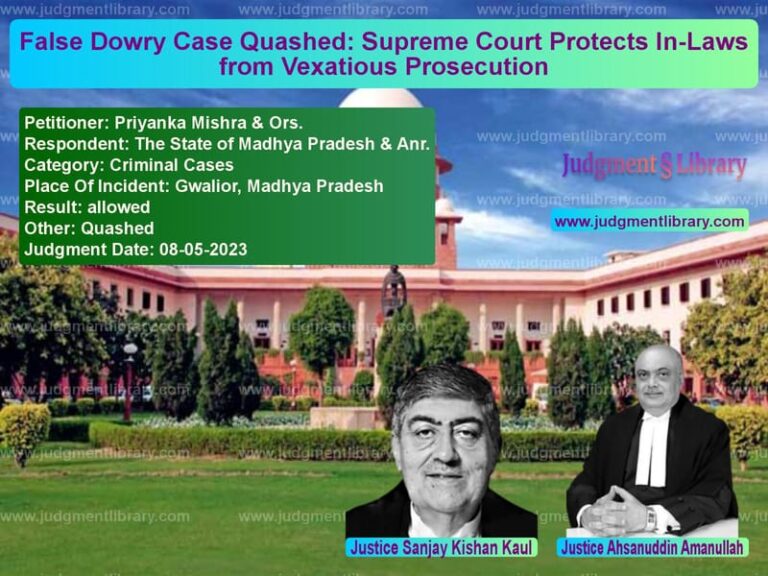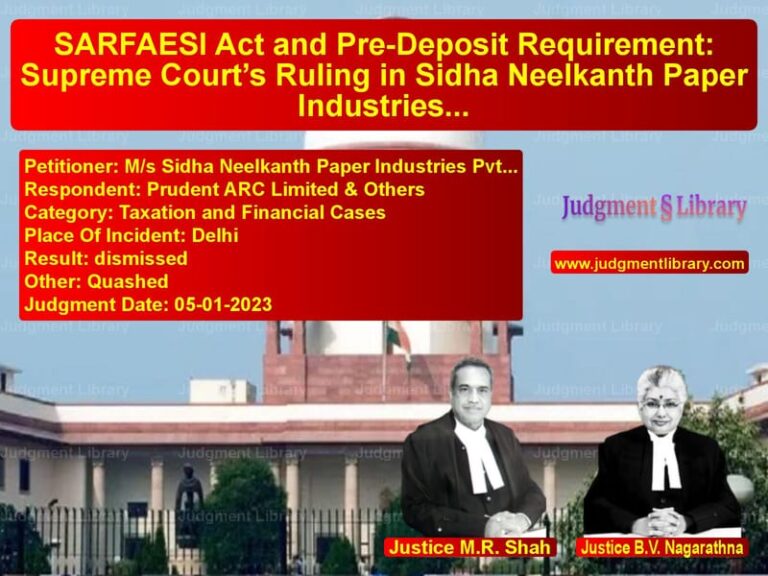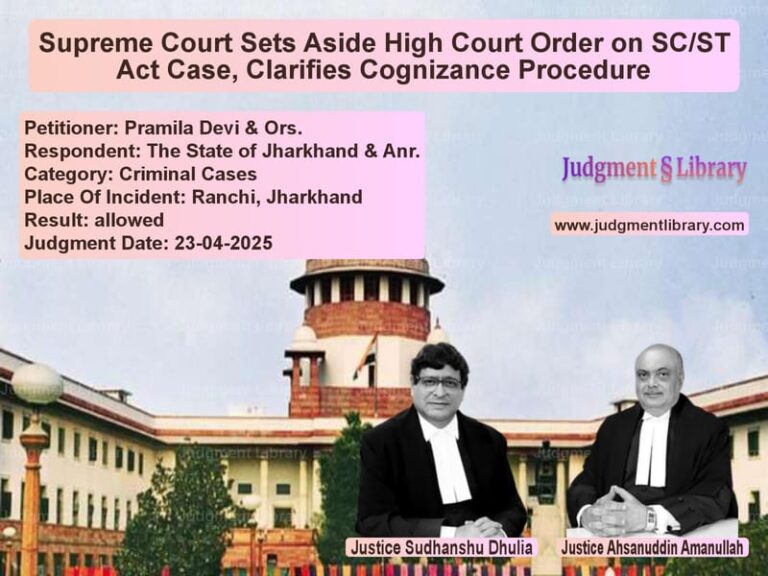Supreme Court Restores Conviction in Jharkhand Rape and Murder Case
The Supreme Court of India recently pronounced a significant judgment reinstating the conviction of Shailendra Kumar Rai @ Pandav Rai in a gruesome case of rape and murder. The case, which originated in Narangi village, Jharkhand, saw the accused acquitted by the High Court of Jharkhand despite strong evidence, including the victim’s dying declaration. The Supreme Court overturned the acquittal and restored the conviction and sentence imposed by the Sessions Court.
The appeal arose from the judgment of the Jharkhand High Court dated January 27, 2018, wherein the High Court allowed the appeal of the accused and set aside the conviction imposed by the Additional Sessions Judge, Fast Track Court-II, Deoghar. The Sessions Court had found the respondent guilty under Sections 302 (murder), 376 (rape), 341 (wrongful restraint), and 448 (house trespass) of the Indian Penal Code (IPC), sentencing him to rigorous imprisonment for life. The Supreme Court, after a detailed analysis of evidence, ruled that the High Court erred in disregarding crucial testimony and restored the Sessions Court’s findings.
Background of the Case
According to the prosecution, on November 7, 2004, the accused forcefully entered the house of the victim, a young girl, and raped her. When the victim attempted to raise an alarm, the accused poured kerosene over her and set her ablaze. Hearing her cries for help, her grandfather, mother, and a villager rushed to her room, by which time the accused had already fled. The victim’s family members, along with the villager, extinguished the fire and took her to Sadar Hospital, Deoghar, for medical treatment.
The police registered an FIR based on the victim’s statement, and the investigation was initiated. The victim succumbed to her injuries on December 14, 2004. Following her death, the investigating officer submitted a supplementary charge sheet under Section 302 IPC.
Witness Testimonies
Prosecution Witnesses
The prosecution examined twelve witnesses, including police officers, medical professionals, and villagers who were present at the scene. Some key testimonies included:
- PW 11 – Lallan Prasad: The station in-charge of Sarwna police station, who recorded the victim’s dying declaration at Sadar Hospital, Deoghar. He testified that the victim was mentally and physically fit to make a statement, which was made in his presence and signed by her.
- PW 6 – Dr. RK Pandey: The medical officer who confirmed that the victim was fit to give her statement. He witnessed the statement being recorded.
- PW 9 – Dr. Minu Mukherjee: A member of the medical board that examined the victim. The report indicated that the possibility of intercourse could not be ruled out.
- PW 8 – Dr. R Mahto: Conducted the post-mortem and concluded that the cause of death was septicemia due to burn injuries.
- PW 12 – Suresh Yadav: A police officer who took over the investigation and submitted the charge sheet.
Defence Witnesses
The defence produced three witnesses, who claimed that the victim sustained burns accidentally while cooking and that the accused was falsely implicated due to prior land disputes.
Sessions Court Conviction
The Sessions Court convicted the accused based on the dying declaration, medical evidence, and police findings. The court ruled that the testimony of prosecution witnesses was credible, and the absence of spermatozoa did not negate the possibility of rape. The Sessions Court sentenced the accused to life imprisonment for murder and ten years for rape.
High Court Acquittal
On appeal, the Jharkhand High Court set aside the conviction, citing inconsistencies in the medical findings and the hostility of key witnesses. The High Court ruled that the dying declaration could not be solely relied upon due to contradictions in witness testimonies and medical reports.
Supreme Court Analysis
The Supreme Court examined the case and found that the High Court had wrongly disregarded the dying declaration, which was voluntarily made by the victim and certified by a medical officer. The Court ruled:
- The dying declaration met the legal threshold under Section 32(1) of the Indian Evidence Act.
- The post-mortem report established that the victim died due to burn injuries.
- The absence of spermatozoa was not conclusive proof that rape did not occur.
- The prosecution had proved its case beyond reasonable doubt.
The Supreme Court reinstated the conviction and ordered the immediate arrest of the accused to serve his sentence.
Observations on the “Two-Finger Test”
The Supreme Court strongly criticized the use of the “two-finger test” conducted on the victim during her medical examination. The Court reiterated that this test is archaic, unscientific, and violative of a woman’s dignity. It directed all medical institutions and government authorities to ensure its complete eradication in cases of sexual assault.
Conclusion
The Supreme Court’s ruling in this case reinforces the significance of dying declarations and affirms the judiciary’s commitment to justice for victims of sexual violence. The judgment also sets a strong precedent against the use of outdated medical procedures that violate human dignity. The ruling restores faith in the judicial process and upholds the rights of survivors of heinous crimes.
Petitioner Name: The State of Jharkhand.Respondent Name: Shailendra Kumar Rai @ Pandav Rai.Judgment By: Justice Dhananjaya Y Chandrachud, Justice Hima Kohli.Place Of Incident: Narangi village, Jharkhand.Judgment Date: 30-10-2022.
Don’t miss out on the full details! Download the complete judgment in PDF format below and gain valuable insights instantly!
Download Judgment: the-state-of-jharkha-vs-shailendra-kumar-rai-supreme-court-of-india-judgment-dated-30-10-2022.pdf
Directly Download Judgment: Directly download this Judgment
See all petitions in Bail and Anticipatory Bail
See all petitions in Attempt to Murder Cases
See all petitions in Fraud and Forgery
See all petitions in Custodial Deaths and Police Misconduct
See all petitions in Suicide Cases
See all petitions in Judgment by Dhananjaya Y Chandrachud
See all petitions in Judgment by Hima Kohli
See all petitions in allowed
See all petitions in supreme court of India judgments October 2022
See all petitions in 2022 judgments
See all posts in Criminal Cases Category
See all allowed petitions in Criminal Cases Category
See all Dismissed petitions in Criminal Cases Category
See all partially allowed petitions in Criminal Cases Category







